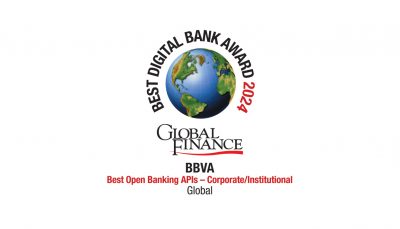Banking executives, directors of open banking, marketing and products, and CEOs of promising fintech startups came from all over Europe and accounted for nearly all the profiles in the industry. There were also supervisors of business units of large banks, searching for the best clue to find the path to net users that will set the stage for future retail banking.
They all gathered at MoneyLIVE Spring 2019, held in Madrid from March 11-13, which started with an inaugural speech from Derek White, Global Head of Client Solutions at BBVA.
He spoke about APIs, regulation, markets, open data and, above all, the king: the user. “We have practiced a lot, researched a lot, talked with our users a lot. And we have reached the conclusion that they want to have control of everything.” This “user-centric” perspective, an absolute mantra in the TIME (Technology, Information, Media and Electronics) industry that has made the foursome of GAFA (Google, Apple, Facebook and Amazon) huge, stated Birte Quitt Head of Group Retail Strategy of Erste Group, one of the main European banks.
And not only is the consumer, or the user, essential, but “the path that the customer journey takes, which you design not only for your customers, but for other customers that are not yours,” said Ricardo Segoviano, Head of BBVA Open Platform Spain. Both took part in the Leader’s Forum of this event, entitled “Open APIs: paving the way for a brighter future.”
We have practiced a lot, researched a lot, talked with our users a lot. And we have reached the conclusion that they want to have control of everything
Accompanying them at the roundtable was Antti-Jussi Suominen, CEO of Holvi, a “neobank” focused on entrepreneurs and freelancers. Without taking the focus away from the user, Suominen, from his position as a startup entrepreneur (“we have less than 100 employees”), indicated that the problems facing open banking in Europe are truly disruptive.
The first and main problem, according to him, is the PSD2 directive: “it is a bit of a mess, because it does not standardize interfaces, and we find that if we really want to do open banking we have to work on as many interfaces as banks that we want to integrate.” According to Antti-Jussi Suominen from Finland, this means that “it is easier for traditional retail banks to take the lead, since they have the resources to handle so much work, while startups cannot cover the entire market, and that also represents problems for defining our marketing strategies.”
Another handicap that the three industry representatives pointed out is the localism of banking in Europe: Although the PSD2 is a European standard that aims to blend national boundaries in an open market for banking, each state has its own local banking regulations. “I would like to have customer journeys through all European markets, because we operate a single digital platform in all those markets.”, explained Quitt.
It is a setback that Segoviano also highlighted, while still being optimistic: “I’m sure that the market will advance toward better services by means of competition, and especially through innovation of the user experience.” He also explained that 12 years ago, with the launch of the iPhone by Steve Jobs, “we were living in a time of huge change, a dramatic shift” and that now “we are entering another big change like that one.”
“The clearer the proposal of value of the services you offer and the easier they are to use and simpler to interoperate with third parties, the more confidence you create,” Segoviano explained. How can we achieve this? “Seeking solutions not just for our customers, but also to create a better digital experience for the customers of our customers, to help drive their digital transformation.”
I’m sure that the market will advance toward better services by means of competition, and especially through innovation of the user experience
For this scenario to develop there is a basic condition, which is also inherent to PSD2: the user, the customer, must allow their data to be shared. “And when we started to ask them in the middle of transactions, their answers, in the vast majority, were no,” laments the director of the Erste Group. Then “we began refining the question and the time, and we improved the responses, but the no’s are still very high.”
To cope with this setback, the Holvi CEO pointed out the need to offer trade-offs: “If we are able to offer good deals derived from the sharing of data and the customer sees the cause-effect relationship, progress will be made. I think, in this regard, we are moving toward a “predictive banking” scenario, in which we can anticipate the needs of the customer, thanks to the power of all this data.”
Here the panel of experts came to one of the biggest roadblocks of the competition in this liquid digital world to ask for opening where, nevertheless, there are others that become roadblocks when it comes to executing it. “Banks are being asked to share data that they have been accumulating from their customers for more than 200 years,” said Quitt, “while others are not doing the same, correct?”
He did not mention any specific companies, but in the context, the acronyms of GAFA and other companies of that industry were hinted at. According to the director of the Erste Group, “If we really want to be relevant and personalize the customer experience and the offers they receive, not only do we need banking data, but also other data,” referring to the data these other companies accumulate.
“One cannot do everything alone. We must be aware of our strengths and our weaknesses, cooperating with others to innovate and provide our customers with comprehensive solutions” explained the Head of BBVA Open Platform Spain. At the end of this interesting open banking game, which began tentatively some years ago and which today seems to already be going at a steady pace, the most important idea can be summarized as, according to Segovia, “the consumer will be the winner.“
If you want to know more about BBVA´s financial APIs, visit this website


























